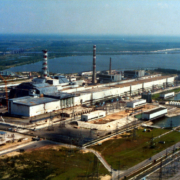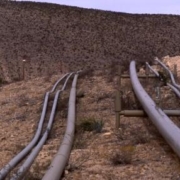BP: Beyond Probablilities
 As much as I intended to cover the pending designation of GNP National Monument in Montana, that will have to wait until next time. This week, there’s just no way a Daly News contributor could fail to focus on British Petroleum and the Deepwater spill.
As much as I intended to cover the pending designation of GNP National Monument in Montana, that will have to wait until next time. This week, there’s just no way a Daly News contributor could fail to focus on British Petroleum and the Deepwater spill.
Punctuated environmental disasters like Bhopal, Chernobyl, and Deepwater have a lot in common with ongoing, insidious disasters like climate change, biodiversity loss, and pollution in general. The insidious disasters are so tightly linked to economic growth you couldn’t separate them with a BP “top-kill” pump. But so are the punctuated disasters. And, as with the insidious disasters, the linkage of punctuated disasters to economic growth is never pointed out in the mainstream media.
The connection has to be pointed out, with emphasis and often, or we can forget about economic policy reform toward a steady state economy. Instead, naïve (or unscrupulous) politicians and economists will call for more economic growth in order to fund all the hapless responses like hair-booms, deepwater robots, and top-kills.
The linkage between economic growth and environmental disaster probably seems obvious or at least intuitive to people such as our CASSE signatories, but we’ve learned that it is far from obvious to many economists, businessmen, politicians, and others who haven’t thought about it in these terms. So let’s think about it a bit…

Image by PDXCreative
Environmental accidents include a long, long list of leaks, spills, collapses, collisions, breaks, explosions, fires, derailments, and other wrecks and mishaps to match the variety of economic endeavors from which they stem. Here we are focused on accidents in the energy sector for two reasons. First, these accidents tend to be some of the most disastrous. Second, they are the most inevitable.
The first point is fairly obvious; the second point bears elaboration. Why are energy sector accidents most inevitable?
While economic growth may not absolutely require, say, diamond mining with all its environmental and social costs, economic growth absolutely requires the use of more energy. Diamond mining may be an optional sector in a growing economy; the energy sector is not. Such is the trophic structure of the economy.
So economic activity requires energy, and a growing economy requires more energy. Next, it doesn’t take a rocket scientist to understand that the probabilities of energy sector accidents increase with – you got it – the level of activity in the energy sector! And gambling with the energy sector is no Saturday jaunt to the tribal casino, where you might hit the jackpot and make an escape. We’re talking about national and global economies – tens of thousands of oil wells, thousands of coal mines, hundreds of nuclear plants, etc. – operating 24/7 and into the long run.
That means the “probabilities” play out!
So it’s not a matter of whether disasters will occur. And there’s no question they will devastate ecosystems, blow by blow (they’re disasters, remember?). At this point, we’re BP: Beyond Probabilities. For all practical and policy purposes, disasters and devastation are certain. The only issue is how many disasters and how much devastation. These amounts are certainly a function of economic growth.
So when they ask for ideas on what can be done about Deepwater or future such disasters, tell them to think of the big picture for a change and realize there’s just no techofix to the probabilities playing out. The only real way to lessen the damage our grandkids will inherit is to start putting the brakes on this runaway economy. That entails macroeconomic policy reform, not technofixes, and consumer care, not consumer “confidence.”
A steady state economy, even at the current dangerous size, would probably be the single greatest thing this generation could accomplish. The next generation may have to work on putting the economy in reverse for awhile, until it fits within the planet’s capacity for disasters. We need to lower the level of economic activity, starting with the energy sector, because in the long run, probabilities play out.





Nice essay, but I have to quibble with the final paragraph. If we don’t take a quick trip to the post-industrial Stone Age, we will destroy the living planet on which our species depends. This is not a “problem” to be solved by the next generation — it’s far too late for that. It’s a predicament, and we must implode the industrial economy now. Otherwise, there will not be next generation to worry about how to save the living planet.
Too late for a steady state economy – the world is now at the peak of all energy production, with the conventional oil peak 5 years in the rear view mirror. The time for introduction of a steady state economy was about when I was born, 1940. By 2030 world oil production will be perhaps a factor two less than now – implying that we are henceforth in the era of economic contraction. First, we need a model (no more economic “theories” please) for economic decline for many decades, then perhaps there will be enough economists left to come up with a model for economic stability – at a level about 10 times less than now, with luck. Peak energy production translates directly to Peak Everything, and humans are very much included in “everything.” The website listed includes links to a series of articles I authored for local residents in extreme northwestern Washington State. Each article includes a very brief bio and numerous references.
Note: I read your article at the Energy Bulletin, which is a peak oil website – hence the nature of this feedback.
cheers,
John
Nice essay, but I have to quibble with the final paragraph. If we don’t take a quick trip to the post-industrial Stone Age, we will destroy the living planet on which our species depends. This is not a “problem” to be solved by the next generation — it’s far too late for that. It’s a predicament, and we must implode the industrial economy now. Otherwise, there will not be next generation to worry about how to save the living planet.